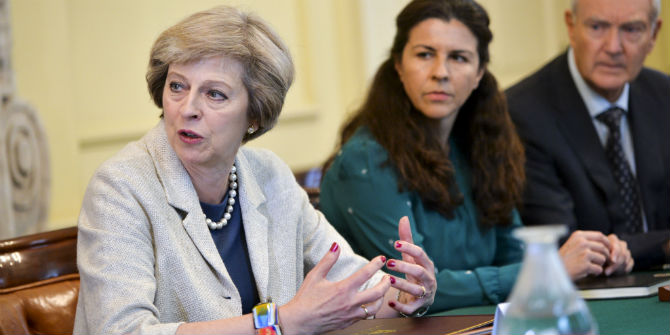 The question of prerogative power is at the heart of the ‘People’s Challenge’ currently before the High Court. Does the government have the power to invoke Article 50 without consulting Parliament? In the first part of her analysis for the Oxford Human Rights Hub, Alison Young looked at the government’s argument that the courts do not have jurisdiction over the decision. In the second, she looks at the arguments on which the Challenge relies.
The question of prerogative power is at the heart of the ‘People’s Challenge’ currently before the High Court. Does the government have the power to invoke Article 50 without consulting Parliament? In the first part of her analysis for the Oxford Human Rights Hub, Alison Young looked at the government’s argument that the courts do not have jurisdiction over the decision. In the second, she looks at the arguments on which the Challenge relies.
The main argument as to the substance of the challenge concerns whether triggering Article 50 can be done by prerogative power alone, or whether this requires legislation.
Three arguments are made by the People’s Challenge: (i) the prerogative power to leave the European Union does not exist, being subsumed by legislation; (ii) the extent of any prerogative power to withdraw from Treaties does not extend to withdrawing from the EU and (iii) to exercise the prerogative power to withdraw from the EU without legislation would be unlawful. Again, the theme of ‘form versus substance’ runs through the arguments.

It is a clear principle of English law that prerogative powers are residual. They only exist to the extent that they have not been extinguished by legislation, either expressly or by specific implication. As the government’s argument makes clear, examined in terms of form, there are no clear legislative provisions establishing a process for withdrawal from the EU, or making it clear that such withdrawal can only be through legislation. The argument of the People’s Challenge relies on the restriction of the prerogative by implication. There is a framework of legislation governing the relationship between the UK and the EU, including the European Communities Act 1972 and the European Union Act 2011. This framework is indicative of an intention to transfer power from Ministers to Parliament, particularly the 2011 Act which sets out when legislation and referendums are required. Although this may appear to be a broad interpretation as to when legislation may restrict prerogative powers by implication, they argue that this interpretation is required when dealing with these constitutional statutes. Constitutional statutes can only be expressly repealed by future legislation. It would appear odd, therefore, if they can effectively be impliedly repealed by an exercise of a prerogative power.
The People’s Challenge bases their argument more on substance than on form. This is made clear in their account of their argument concerning the extent of any prerogative power in relation to the making and withdrawing from Treaties, which they argue does not extend to allow the executive to alter the law and thereby modify or remove the rights of UK citizens. They argue that, in effect, all rights of EU citizens will cease from the moment that Article 50 is triggered, given that this process inevitably leads to these rights being removed.
Appealing – on the face of it
The more substantive argument of the People’s Challenge is prima facie appealing. There is a strong normative argument for legislation; such a constitutionally important issue requires full parliamentary debate. However, form is also important here. Article 50 makes it clear that the UK is a member of the EU until the negotiation period ends, or a withdrawal agreement is ratified. The European Communities Act 1972 will be relied upon as the means of incorporating EU law into domestic law, at least until the coming into force of the proposed ‘Great Repeal Bill’, which appears to be designed to transform all existing EU rights and obligations into UK rights and obligations, pending deliberation over their possible future repeal. Parliament will have its say – only this comes later when the withdrawal process determines the new set of rights that then have to be incorporated into English law, or when existing rights are generally incorporated, followed by specific legislation to determine which rights will then be repealed.
The strongest argument of the People’s Challenge is that prerogative powers cannot be exercised in a manner which thwarts the purposes and objects of the constitutional framework put in place to govern the relationship between the UK and the EU, or in a manner designed to avoid public scrutiny through parliamentary debate. This is drawn from the Bill of Rights 1689 and a broad reading of the Fire Brigades Union case (FBU), which the Government interprets in a more formalistic manner.
In FBU, legislation required the Minister to consider when to bring in a statutory-based scheme of compensation, set out in a legislative Schedule. However, the Minister instead enacted a less generous scheme through an exercise of prerogative power. The House of Lords concluded, by a majority, that the Minister had breached his statutory duty to consider when to bring in the statutory scheme.
Interpreted in a formalistic manner, it could be argued that the Minister could still have considered whether to introduce the statutory scheme, as set out in the legislation. However, in reality, the prerogative was being used to undermine the more generous statutory scheme, leading Lord Brown-Wilkinson to remark that it would be surprising if the prerogative could be use to’ frustrate the will of Parliament’ or ‘pre-empt the decision of Parliament’. The broader reading may therefore be a better interpretation of FBU and a better example of constitutional adjudication.
Nevertheless, the situation is different in Miller. The executive is not pre-empting a clearly established will of Parliament. Rather, triggering Article 50 without legislation removes the ability of Parliament to debate the variety of Brexit the UK should be pursuing. Moreover, it is hard to conclude that triggering Article 50 does mean that rights are inevitably lost without further parliamentary debate if the ‘Great Repeal Bill’ really will preserve the existing EU rights from the moment of leaving the EU, providing Parliament with the opportunity to debate which rights will be repealed and which will remain. The real worry with the ‘Great Reform Bill’ will be whether it includes a ‘Henry VIII’ clause, empowering the executive to remove these rights through delegated legislation. This interpretation is not to advocate ‘form’ over ‘substance’; it merely requires care to be taken when determining whether an executive action really is being used to frustrate the will of Parliament.
This post represents the views of the author and not those of the Brexit blog, nor the LSE. It first appeared at the Oxford Human Rights Hub.
Alison L Young is a Fellow at Hertford College and teaches constitutional law, administrative law, media law and comparative public law. She researches in applied constitutional theory, public law and human rights. She is the author of Parliamentary Sovereignty and the Human Rights Act (Hart, 2009) and Citizen Engaged?: Democratic Dialogue and the Constitution (forthcoming: OUP 2017).






